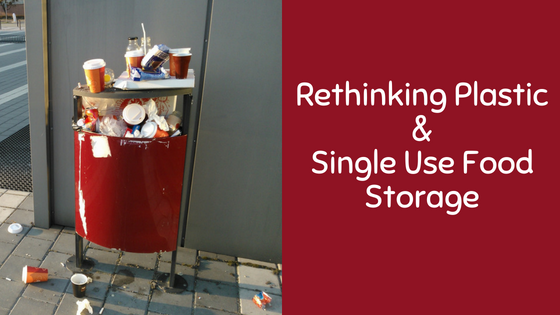One of the things our company is passionate about is reducing the amount of single-use products that exist in the world. We don’t want to only see single-use menstrual products reduced, we’d love to see a reduction in all similar products worldwide. Not only do these products account for a massive amount of waste in the world, they can also have some pretty alarming health effects connected to them.
Single-use food storage containers account for a remarkable amount of trash every year. While some areas are taking action, by banning certain types of single-use containers, there’s still a lot to be done.
Why Not Use Plastic Containers?
Yes, reusable plastic containers exist. But did you know that many people only use these types of containers once? There is also a crisis in plastic recycling occurring and many recycling facilities are either being forced to stop recycling plastic, are shipping plastics overseas to be recycled, or are dealing with massive piles of non-recyclable plastic. Swapping to reusable plastic containers is a better option than single-use containers, but still not ideal.
Here are some statistics on single-use food storage containers & plastics:
- Approximately 150 million tons of “disposable” plastics and packaging are thrown away each year worldwide, according to the National Institute of Environmental Health Sciences
- The EPA estimates over 23% of items reaching US landfills are food storage containers or single-use food packaging
- Environmental Health Perspectives found that 455 commercial plastics leach harmful chemicals
- Plastic is the most common ocean pollutant, up to 80% of the trash in the ocean is plastic and accounts for the death of countless marine animals daily
- Chemicals from plastics have been found in human breast milk & urine
- Rising concern exists about the impact these chemicals has on developing children, both in the womb and after birth
Alternative Options Abound
With these alarming statistics, and many more out there, what can be done to make a change? Fortunately, a lot of great alternative options exist and some cities are even getting involved. Areas like Seattle, San Francisco, and Boulder have made news by banning certain single-use plastic items or implementing only compostable takeout containers.
- Compostable containers- A growing number of restaurants are offering compostable containers, and many towns now have curbside composting. The only catch to this is that you can’t throw these in your backyard compost pile, they have to be composted in a special commercial composting area.
- Tip- Reach out to your local Whole Foods Market or anywhere else you know offers composting, they’ll often allow you to bring your compostable containers in!
- Glass– Using glass is the best option for many people. Reusable glass containers don’t carry the health risk that plastics do, they’re much easier to be recycled if they need to be, and they’re easy to clean. Some companies are now even selling glass containers with silicone sleeve on the outside so they’re shatter resistant.
- Beeswax Wraps– Fabric coated in a special beeswax formula can be used as an alternative to plastic wrap. They are popular for home food storage, and to-go meals. (Come back next week to check out our interview with the founder of Bee’s Wraps)
- Reusable straws- Straws alone account for a massive amount of waste. There are a growing number of companies offering a reusable alternative, typically either glass or stainless steel. You can even find them with your favorite colors, cute animals, and fun patterns so you’ll always know which straw is yours.
- Tip- Remember pipe cleaners? Yes, those colorful fuzzy sticks of your childhood crafts. These are your best friends for cleaning straws! Or get a specially made straw cleaner
- Bring Your Own- When you’re going out to eat or to the grocery store, bring your own containers. Unfortunately, due to health regulations in each area, not all stores are able to fill your own containers so it’s best to call first. If you can, however, get your groceries or leftovers placed into your own container. Otherwise, ask for minimal packaging and place them into your containers for proper food storage at home.
- Tip- If your local health regulations don’t allow refillable containers, petition your local government and try to at least get the store to swap to a healthier alternative
- Refuse- The most powerful change we can make is by voting with our dollars. By refusing to purchase grocery items in single-use packaging and refusing to shop at places without sustainable options, we can make a powerful impact.
For more tips on reducing your single-use products, check out the Waste Less & Be Green series.
















